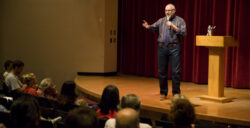Renowned religious leader Rabbi Rami Shapiro presented “Seekers Without Borders: Perennial Wisdom for the Spiritually Independent,” a lecture exploring the idea of perennial wisdom through an existential lens last night at the Multicultural Center Theater.
Co-sponsored by the Walter H. Capps Center for the Study of Ethics, Religion and Public Life and the Department of Religious Studies, the event began at 6 p.m. and acted as a part of MCC programs on interfaith issues. Shapiro’s lecture compared religiosity and spirituality, in an effort to approach the interfaith dialogue through different world traditions. The lecture was followed by a Q&A session.
According to Shapiro, religiosity is formed as a result of the human propensity to ask five existential questions, which are related to larger ideas such as the meaning of life and the purpose of human existence.
“They’re all ways of tackling these questions — ‘Who am I? Where did I come from? Where am I going? How should I live? And why?’” Shapiro said. “We all have our own ways of answering them … We keep asking the same questions over and over again, and when an answer doesn’t work in one religion, we either revise that religion or invent a new one.”
Shapiro said when he speaks of “religion,” he is referring to corporate religions, or what he calls brand-named religions, and he said these more established faiths include, but are not limited to Judaism, Christianity, Islam, Hinduism and Buddhism.
“I see them all as corporate structures, and you can even see them as brands — competing brands. Each one has its own message; each one has its own claim as to why it’s the best one,” Shapiro said. “I am not enamored with the notion that all religions say the same thing. I don’t think that’s true. I don’t believe that all religions are praying to the same god.”
For example, according to Shapiro, Judaism depicts God as childless, but in Christianity, God does have a son in Jesus Christ. He said such clashes do not indicate, however, that God is different per each religion.
“It means the corporate theologies are different,” Shapiro said. “We should honor the difference and not pretend that they’re all the same.”
In light of religion’s defining ability to allow human beings to question their existence, Shapiro said spirituality is defined as the way humans invest thought into these questions.
“It is through meditation, through contemplation, through study, through devotion — different things people have discovered or invented throughout human existence and put in one form or another to help us deal with the question of who am I, where do I come from and so on,” Shapiro said.
Therefore, according to Shapiro, the contrast between religiosity and spirituality lies in what it actually offers the individual as well as the level of fulfillment it can provide.
“You know you’re engaging in deep spiritual practice because ultimately, it transforms your life. You’re lighter, you’re more joyous, you’re more loving, you’re more compassionate,” Shapiro said. “The question you have to ask yourself about religion, at this point in human evolution is, ‘Is it doing that for us?’”
Much of the doubt surrounding institutionalized, more mainstream religious systems arises when issues of immortality and afterlife are called into question, according to Shapiro.
“That’s when the rubber hits the road — what does your god do to those who do not believe in the same god you do?” Shapiro said. “Many people … just can’t imagine a god who is so brand-attached, that if you don’t do it … you won’t go to heaven. Most of us cannot imagine belonging to a religion that promotes that kind of thinking.”
During a Q&A session with the audience, Shapiro was presented with a question regarding the importance of prayer in religion and spirituality. Shapiro responded that prayer that is crying out for God’s help during a moment of extreme trauma is a sensible concept; however, he said prayers requesting material items or events from God are egotistical.
“I have no problem with [prayer] … if it’s expressing fear, gratitude and awe. Those are things we all experience and we all have some way of articulating,” Shapiro said. “But what I have trouble with is when we try to get God to change reality for us. It becomes narcissistic.”
According to Professor of Religious Studies Kathleen Moore, who introduced Shapiro at the beginning of the lecture, Shapiro’s perspective does not necessarily focus on following one singular, organized faith. Instead, Moore said that Shapiro’s viewpoint actually seeks to study how individuals relate to each other through examining how everyone practices spirituality, in its many forms.
















